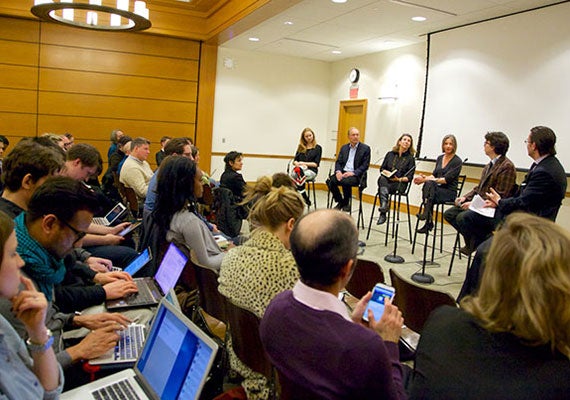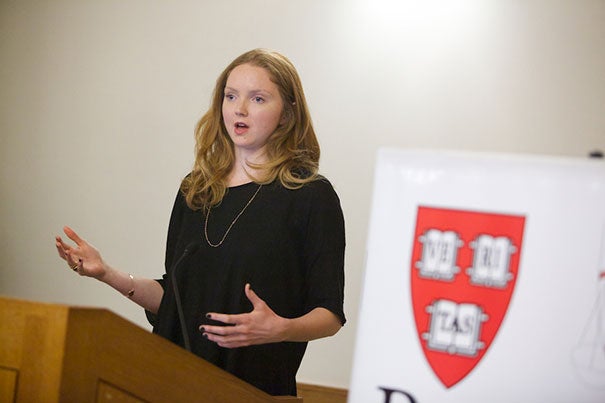Impossible.com celebrates altruism as a community value and goal
The following article originally appeared in the Harvard Gazette on March 7, 2014.
For 12 years, Lily Cole’s fiery red hair and porcelain features helped land the statuesque model on the cover of magazines and the runways of fashion powerhouses such as Chanel, Prada, and Louis Vuitton. But these days she is increasingly known for her cyber savvy and social networking site.
Cole’s brainchild, the altruistic website and app Impossible.com, is based on an almost impossibly simple premise: the conviction that people can and should help each other, for free. The service launched in England last fall and has 25,000 users.
“Imagine everybody in this room was there to support you. If you needed anything, [they] had your back. Imagine if that was everybody in Boston. Imagine if that was everybody in the states,” Cole told a crowded hall at Harvard Law School Wednesday evening at an event celebrating the U.S. launch of her website. “Imagine if everybody in the world you knew would support you if you needed it. The small price to pay is that where you see the opportunity to help another, you can and you do. That’s the kind of world that I would love to feel more a part of.”
The event was hosted by Harvard’s Berkman Center for Internet & Society, and included a panel discussion with the creator of the Web, Sir Tim Berners-Lee, Berkman Fellows Rosemary Leith and Judith Donath, and Berkman Director and Harvard Law School Professor Jonathan Zittrain. The Berkman’s executive director, Urs Gasser, moderated.
Zittrain said Cole’s ability to use her own celebrity and fan base to inspire people to help others was brilliant.
“You’ve built a platform that told people: Don’t even follow me and my particular thing … [but] pick a way in which you would like to respond to a stranger and connect with them and own that, and by doing that, you will honor whatever good feelings you have about me. … That infuses this otherwise neutral platform with [such] a certain starting spirit that it can then exist independently and go off in the direction it goes.”
Later, Zittrain said his wish for the website and application “is for it to surprise us all with just how powerful it can be.”

While the Web’s original, neutral platform, doesn’t naturally “work better for altruistic things … it gives us a choice for what we build on top … it gives us the chance to start again,” said Berners-Lee. “So more power to Impossible.”
Cole first came up with the idea three years ago while en route to visit refugee camps on the Thailand-Burmese border. Chatting with a friend, they discussed the idea that a struggling economy shouldn’t mean the collapse of society. People, Cole thought, have endless resources at their disposal, and there should be a “way to mobilize that.”
With advice from backers like Jimmy Wales, whose website Wikipedia relies on tens of thousands of volunteers to update the popular cyber encyclopedia, and economist Muhammad Yunus, winner of the 2006 Nobel Peace Prize for his pioneering approach to eradicating poverty through microcredit lending, Cole created her site and application, where users post wishes that other users can answer for free with their own skills, services, advice, or products.
Wishes on the site range from the physical (“I wish I could get lots of magazines for free from all over the world”) to the philosophical (“I wish more people would laugh instead of fighting”). Like Twitter, Cole’s social network allows people to follow each other and uses hashtags to help people search for specific subjects or content. The only “currency” on the website exists in the form of digital notes in which users publicly thank others for their help.
“It reflects what’s happening in the system,” said Cole, “without potentially quantifying it and making it go in to an exchange modality. So you can say thank you as much as you want.”
With Facebook and Twitter, where the users’ lives are often the center of attention, Impossible’s mission is focused on others and around themes of reciprocity, giving, kindness, and helping strangers. There have been studies, including work done by a Harvard Business School professor, that suggest Cole’s model might be one way toward a happier world.
In his recent book “Happy Money: The Science of Smarter Spending,” co-authored with Elizabeth Dunn, Michael Norton, associate professor of business administration and Marvin Bower Fellow at Harvard Business School, said research showed that spending money on others instead of on yourself can make you more content. When you give money to other people, Norton told the Gazette earlier this year, “it turns out it does make you happier.”
“We do actually receive when we give, and when we break [open] that thought paradigm, there’s actually something very powerful that can happen,” said Cole.
A lighthearted moment near the end of the discussion helped to demonstrate that not only does Cole’s vision appear on track, but she adheres to her new venture’s founding ethos. During a question-and-answer session, a member of the crowd wished for a drink of water. Cole stepped from her chair to offer the woman her unopened bottle.
